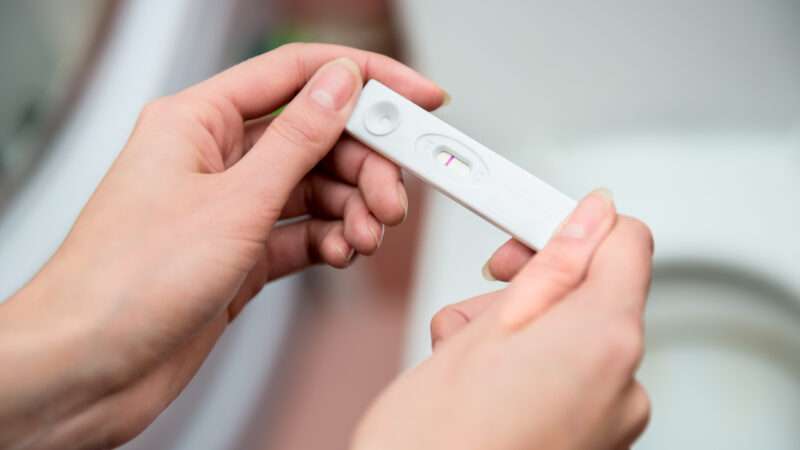
It's astounding how many novel ways politicians can propose to invade privacy. The latest comes from Alabama, where a new bill would require women from ages 25 to 50 to produce a negative pregnancy test from a doctor or medical lab before purchasing medical marijuana. The test would have to be conducted within 48 hours of the purchase.
The measure—which passed a Senate committee in a 7–2 vote last week—comes from state Sen. Larry Stutts (R–Tuscumbia), who also works as an obstetrician and gynecologist.
The National Advocates for Pregnant Women (NAPW) has called the bill "blatantly unconstitutional and unprecedented."
"We are very concerned that this is an invasion of the privacy of Alabama women and their right to equal protection under the law," NAPW attorney Emma Roth told AL.com.
Under Stutts' proposal (S.B. 324), medical marijuana dispensaries would "require a negative pregnancy test for women of childbearing age before allowing them to purchase medical cannabis," per a legislative summary of the bill. Pregnant women on the marijuana patient registry would also be required to report pregnancies to the physician who approved their patient status.
Having to go to a doctor or medical lab and pay for a pregnancy test before every medical cannabis purchase would be not only invasive but inconvenient. In effect, it's an added tax on young(ish) female patients.
The bill would also ban new moms who are breastfeeding from purchasing medical marijuana for themselves. It does not say how this ban would be enforced.
Alabama only recently legalized medical marijuana (and with a lot of caveats). Gov. Kay Ivey signed a medical marijuana legalization measure into law in May 2021, and the state has yet to license any dispensaries. The Alabama Cannabis Commission has until this upcoming September to creating a system for dispensary licensing, a patient registry system, and rules for cannabis packaging, labeling, and advertising.
The state already limits the number of dispensary licenses that can be issued to a mere four, and it bans dispensaries from being located within 1,000 feet of any "school, day care, or child care facility." Stutts' bill would further restrict where dispensaries could operate by stipulating that this rule includes home-based child care operations and colleges.
All these restrictions will probably discourage even many people who could qualify as patients from registering and purchasing through the state's legal system. If Stutts' bill passes, it will become yet another incentive for patients to bypass state dispensaries and keep buying on the black market.
Science matters. There is no evidence that marijuana poses unique risks of harm during pregnancy or higher risk than any of the many medications pregnant people use, prescribed or not. In addition to being unconstitutional, it is not evidence-based. https://t.co/GsC1GQ4NwM
— National Advocates for Pregnant Women (@NAPW) April 1, 2022
FREE MINDS
Colorado cyberbullying law is unconstitutional. A 2015 Colorado law made it a misdemeanor—punishable by up to six months in jail and a $750 fine—to initiate communication with or direct language toward someone via phone, text, instant message, "or other interactive electronic medium in a manner intended to harass or threaten bodily injury or property damage" or to convey something obscene, provided the communicator has an "intent to harass, annoy, or alarm another person." The Colorado Supreme Court has now judged this law to be a violation of the state and federal constitutions, due to its potential to punish people for protected speech.
"The law could criminalize online communication like negative restaurant reviews, social media posts about public health protocols, irate emails, diatribes posted about public figures by disgruntled constituents, or antagonistic comments left on news sites," notes The Denver Post. "The state Supreme Court struck down only the phrase 'intended to harass,' and left in place the rest of the cyberbullying statute, which prohibits communication that "threaten(s) bodily injury or property damage" or is obscene. The law can no longer prohibit communication merely because it is "intended to harass," the justices found."
FREE MARKETS
The new nicotine prohibition era is upon us. "Regulators have long targeted tobacco products, but there's new energy behind outright bans on vapes and cigarettes," writes Jacob Grier in Reason's May 2022 issue. Grier details what's driving this new momentum, where it's going legislatively, and what the potential consequences might be:
In July 2014, five New York City police officers approached Eric Garner on a Staten Island sidewalk and accused him of illegally selling "loosies"—individual cigarettes without a tax stamp. Garner resisted handcuffs, and a scuffle ensued. Officer Daniel Pantaleo placed Garner in a prohibited chokehold while pushing him down to the ground face-first. After protesting 11 times that he could not breathe, Garner lost consciousness and died within the hour, sparking national outrage and raising awareness of the Black Lives Matter movement.
American policy regarding tobacco-based products has become considerably more restrictive since Garner's death, putting illicit market participants on a collision course with law enforcement. Even as the country finally begins to acknowledge the disastrous consequences of the war on drugs, government officials are increasingly taking a prohibitive approach to nicotine.
Read the whole thing here.
QUICK HITS
• There's been controversy on the U.S. Food and Drug Administration advisory committee over a second COVID-19 vaccine booster for healthy adults.
• A complete list of the winners at last night's Grammy Awards.
• Viktor Orbán, Hungary's far-right prime minister has reportedly won a fourth consecutive term in office.
• A federal court has ruled that "a Texas law that limits the use of remotely piloted drones to capture images is unconstitutional," reports the Dallas Observer.
• Poptarts has won a lawsuit over whether its labels are misleading.
• Inside House Zero, a 3D printed house in Austin, Texas.
• Against scientific gatekeeping.
The post Alabama Bill Would Require Negative Pregnancy Test To Buy Medical Marijuana appeared first on Reason.com.







